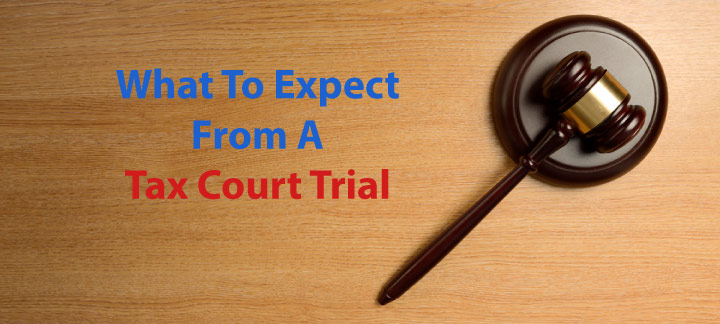What to Expect at a Tax Court Trial
If you are preparing for a Tax Court trial, you likely have many questions regarding what to expect. On the first day of your trial, the Tax Court trial clerk will announce the calendar call, which announces the name of each case that has not settled. At this time, the taxpayer and his or her counsel should be prepared to come forward when called by the trial clerk and announce his or her name to the Tax Court judge. The attorney representing the IRS will also typically announce himself or herself to the Tax Court judge, and the Tax Court will then ask a few questions to determine the status of the case. After this initial calendar call, the Tax Court judge will schedule the trial for specific cases at specific times during the trial session. The time and date for your Tax Court trial will be announced by the judge or court clerk.
What Happens if the Taxpayer is Not Ready for Trial?
If a taxpayer finds that he or she is unable to come to Court on the scheduled date of the trial, or are simply not prepared for the trial when it arrives, they may be able to work with the Court to reschedule the trial date. There are several options for dealing with this situation:
- The taxpayer should attempt to file a motion for continuance with the Tax Court judge as soon as possible. If the judge grants the request, it may be possible to postpone the trial.
- Alternatively, the taxpayer could attempt to ask the IRS attorney if he or she will agree to postpone the trial date through a request for continuance. A request for continuance must be agreed to by both parties and approved by the Tax Court judge. If the request for continuance is not granted, the taxpayer should be prepared to go to trial on the originally scheduled date.
- Sometimes, a case can be considered by the Tax Court without the need for a full trial by submitting the case fully stipulated. To fully stipulate a case to the Tax Court without trial, the taxpayer and the IRS attorney should agree about all the facts and documents to be admitted to the record, and whether the case is suitable for this process. If the parties pursue this option, they should draft a stipulation of all the facts and evidence which would be necessary for the Tax Court to make its decision. The Judge in the case will then review the stipulation containing all facts and documents, and render a decision based solely on those agreed facts and documents. Thus, if your case can be successfully stipulated to the Tax Court in advance of the calendar call, then you will not be required to appear in court on the actual trial date.
What Happens at the Trial?
At the start of the trial, the clerk of the court will call your case, and your attorney and the IRS attorney will state their names. The judge will then take care of preliminary matters, such as filing the stipulation of facts or the pretrial memoranda. Sometimes, the parties may, but need not, make an opening statement, which is simply a statement of what the party believes the facts of the case and law are and how the Judge should rule on the matter. When opening statements are made, the taxpayer typically makes the first statement. Opening statements are typically not made under oath, which means that any facts used in the opening statement cannot be considered by the Judge unless they are independently established by sworn testimony. Thus, sometimes the opening statements themselves should be made under oath so that the counsel can avoid having to repeat and establish facts later on in the trial.
After the opening statements are completed, the parties will each present their witnesses. The purpose of presenting witnesses is to provide relevant information to the Tax Court judge and allow the judge to find facts from the evidence provided. Oftentimes, the first and only witness in a Tax Court trial is the taxpayer. A taxpayer who also serves as a witness will need to take an oath to tell the truth before providing any testimony. If you are being represented by counsel, your counsel with question you on direct examination. After direct examination, the taxpayer will then be cross-examined by the IRS attorney, and if necessary, may provide additional testimony to clarify any answers provided by the cross-examination. After the taxpayer’s testimony, the same procedure will be followed with any additional witnesses. Next, the IRS will present any of its witnesses, who will be subjected to direct and cross-examination. Throughout the course of the trial, the judge may ask for clarification or additional evidence on any of the testimony provided by the witnesses to the trial. Once all the witnesses and evidence have been presented to the court, the trial will be over and the parties will await a decision.
How a Tax Attorney Can Help with Your Tax Litigation
If you are contemplating a deficiency litigation, then you must consult with an experienced tax attorney. Tax Lawyer William D. Hartsock has been successfully helping clients with tax issues since the early 1980s. Mr. Hartsock offers free consultations with the full benefit and protections of attorney client privilege to help people clearly understand their situation and options based on the circumstances of their case. To schedule your free consultation simply fill out the contact form found on this page, or call (858) 481-4844.



Comments (0)